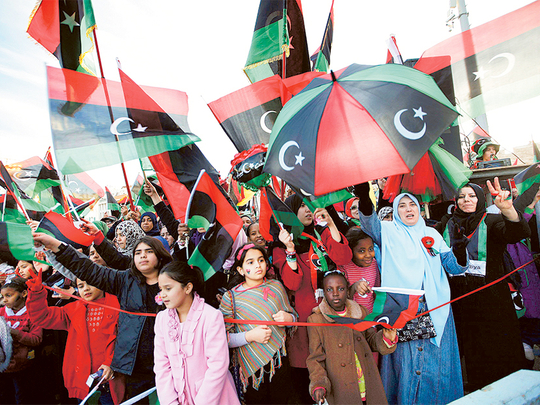
Cairo: Western powers stressed the need for a political solution to the crisis gripping Libya, seemingly rebuffing Egypt’s call for the United Nations to authorise military intervention in the war-torn north African state on Wednesday.
President Abdul Fattah Al Sissi said “there is no choice” but to create a global coalition to confront the extremists in Libya after Cairo launched air strikes in retaliation for the militant group’s beheading of 21 Egyptians who were Coptic Christians.
The matter was be taken up by the UN Security Council on Wednesday in New York after a request by Egyptian Foreign Minister Sameh Shoukry, who is seeking backing for military intervention and to “full support” against the terrorists, his ministry said.
Arab diplomats have expressed support for Egypt’s request, but said they thought it would also require formal backing from Libya.
That could prove difficult to secure, however, as Libya currently has two rival parliaments and governments — one side with ties to Islamist terrorists and the other recognised by the international community.
Western powers also seemed to distance themselves from the calls for military action, saying a UN-backed attempt to get Libya’s warring sides to negotiate was the “best hope” for peace.
The United States, Britain, France, Germany, Italy and Spain in a statement released by Rome said the recent beheading of 21 Egyptian Christians showed “once again the urgent need for a political solution to the conflict”.
Cairo’s diplomatic push comes a day after Egyptian F-16s bombed militant bases in Derna and on the fourth anniversary of the beginning of the 2011 Nato-backed revolt that ousted dictator Muammar Gaddafi.
The raids were ordered hours after Daesh in Libya released a gruesome video showing the beheadings of 21 Coptic Christians who were in the North African country seeking work and were captured by the group.
UN High Commissioner for Human Rights Zeid Ra’ad Al Hussain called the murders a “vile crime targeting people on the basis of their religion”.
Cairo is encouraging the hundreds of thousands of Egyptians still in Libya to leave, said foreign ministry spokesman Badr Abdul Atty.
‘Very complicated’
Libya has been gripped by turmoil since Gaddafi’s overthrow and Egypt has long said the Nato intervention to help the rebels left it to contend with chaos on its western border.
“The mission was not finished,” Abdul Atty said.
France, which agreed on Monday to sell Egypt advanced Rafale warplanes, has called with Cairo on the UN to adopt measures to confront the militants in Libya.
Italy also ruled out intervention without UN backing and suggested a political solution remained the best option.
The breakdown of government in the former Italian colony has contributed to a dramatic increase in the number of African and Middle Eastern migrants and refugees arriving on its shores by sea after transiting through Libya.
“What is happening is very complicated. We are following events closely and with concern but there is no need to jump from total indifference to hysteria and an unreasonable reaction,” Prime Minister Matteo Renzi said.
The European Union said it would discuss joint action on Libya with the Egyptian and US governments this week, but that it saw no role in any military intervention for now.
Chaos in Libya has seen the rival governments and powerful militias battling for key cities and the country’s oil riches, providing fertile ground for Daesh.
Several Libyan groups have pledged allegiance to Daesh, which last year seized large parts of Syria and Iraq, declaring a “caliphate” and committing widespread atrocities.
Delegates from Libya’s rival parliaments held UN-mediated indirect talks this month described as positive.
But Egypt says it would be naive to hope for a speedy settlement, insisting the terrorists must be confronted.
“There are terrorist organisations in Libya that are not abiding by their commitments; they are not serious about dialogue,” said Abdul Atty.
Monday’s strikes were the first time Egypt announced military action against Daesh in Libya.
Experts say Al Sissi wants to be seen as a key ally of the West against Islamist extremism, deflecting international criticism of his crackdown on the Muslim Brotherhood of former president Mohammad Mursi, whom he ousted in 2013.
As well as Libya to the west, Egypt is dealing with an insurgency in its own east, in the Sinai, where militants have also joined Daesh and killed scores of troops.
Abdul Atty said it was time for the international effort against Daesh, which has been hammered by US-led air strikes in Iraq and Syria, to focus on its presence elsewhere.
“Just as there is movement against Daesh in Syria and Iraq, we want the world to turn its attention to Libya,” he said.












